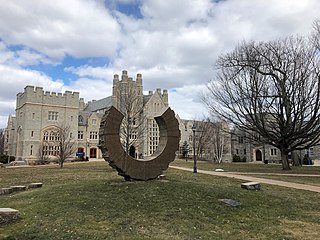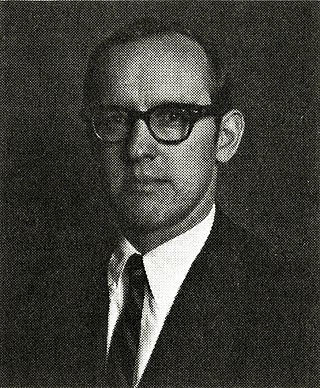
A law school in the United States is an educational institution where students obtain a professional education in law after first obtaining an undergraduate degree.

The University of Connecticut School of Law is the law school associated with the University of Connecticut and located in Hartford, Connecticut. It is the only public law school in Connecticut and one of only four in New England. As of 2020, it enrolled 488 students.
Dale Minami is a prominent Japanese American civil rights and personal injury lawyer based in San Francisco, California. He is best known for his work leading the legal team that overturned the conviction of Fred Korematsu, whose defiance of the incarceration of Japanese Americans during World War II led to Korematsu v. United States, which is widely considered one of the worst and most racist Supreme Court decisions in American history.

Christine Meaders Durham is an American lawyer and judge, who served as a justice of the Utah Supreme Court from 1982 to 2017, including service as chief justice from 2002 to 2012.

The University of Florida Fredric G. Levin College of Law is the law school of the University of Florida located in Gainesville, Florida. Founded in 1909, it is the oldest operating public law school in Florida and second oldest overall in the state.
Seton Hall University School of Law is the law school of Seton Hall University, and is located in downtown Newark, New Jersey. Seton Hall Law is the only private law school in New Jersey. The school confers three law degrees: Juris Doctor, Master of Laws, and Master of General Legal Studies. Founded in 1951, it is accredited by the American Bar Association (ABA), and is also a member of the Association of American Law Schools (AALS).
Michael Byron Nifong is an American former attorney and convicted criminal. He served as the Durham County District Attorney until he was removed, disbarred, and very briefly jailed following court findings concerning his conduct in the Duke lacrosse case, primarily his conspiring with the DNA lab director to withhold exculpatory DNA evidence that could have acquitted the defendants.
Robinson O. Everett was an American lawyer, judge and a professor of law at Duke University.
The Duke lacrosse case was a widely reported 2006 criminal case in Durham, North Carolina, United States, in which three members of the Duke University men's lacrosse team were falsely accused of rape. The three students were David Evans, Collin Finnerty, and Reade Seligmann. The accuser was Crystal Mangum, a student at North Carolina Central University who worked part-time as a strip tease dancer. She alleged that the rape occurred at a party hosted by the lacrosse team, held at the Durham residence of two of the team's captains, and where she had worked on March 13, 2006.

Bruce M. Botelho is an American attorney and politician in the U.S. state of Alaska. He served as the mayor of Juneau from 1988 to 1991 and from 2003 to 2012. Born and raised in Juneau, where his father was a top official of the Alaska Highway Patrol, Botelho has pursued concurrent careers in law and politics, largely with success. He also previously served a term as mayor from 1988 to 1991, defeating former Alaska Secretary of State Robert W. Ward in the election. He spent most of his professional career as an employee of the Alaska Department of Law. He rose to the top position in the department in 1994, when Governor Walter Hickel appointed him to be the Alaska Attorney General. Retained by Hickel's successor, Tony Knowles, Botelho served as Attorney General for nearly nine years before retiring from state service.
Richard A. Danner was an American legal scholar, the Archibald C. and Frances Fulk Rufty Research Professor of Law Emeritus at Duke University School of Law in Durham, North Carolina. He held the position of Senior Associate Dean for Information Services and served in various capacities at Duke, starting in 1979, and was appointed Director of the Duke University Law Library in 1981. Prior to working at Duke, Richard Danner served as a law librarian at the University of Wisconsin–Madison, where he received degrees in law and library science.

Mahala Ashley Dickerson was an American lawyer and civil rights advocate for women and minorities. In 1948 she became the first African American female attorney admitted to the Alabama State Bar; in 1951 she was the second African American woman admitted to the Indiana bar; and in 1959 she was Alaska's first African American attorney. In 1983 Dickerson was the first African American to be elected president of the National Association of Women Lawyers. Her long legal career also helped to pave the way for other women attorneys. In 1995 the American Bar Association named her a Margaret Brent Women Lawyers of Achievement honoree.
The South Carolina Bar is the integrated (mandatory) bar association of the U.S. state of South Carolina.

Duke University School of Law is the law school of Duke University, a private research university in Durham, North Carolina. One of Duke's 10 schools and colleges, the School of Law is a constituent academic unit that began in 1868 as the Trinity College School of Law. In 1924, following the renaming of Trinity College to Duke University, the school was renamed Duke University School of Law.
The North Carolina Central University School of Law is the law school associated with North Carolina Central University. The school is fully accredited by the American Bar Association (ABA) and the North Carolina State Bar Council, and is a member of the Association of American Law Schools (AALS). According to NC Central's official 2018 ABA-required disclosures, 37.9% of the Class of 2018 obtained full-time, long-term, JD-required employment nine months after graduation.
The Alaska Bar Association (ABA) is a mandatory bar association responsible for the Alaska Supreme Court and for the admission and discipline process of attorneys for the state of Alaska.
Utah State Bar is the regulatory agency established by the Utah Supreme Court to regulate the practice of law in Utah. The Utah State Bar is funded by dues from members, Bar exam dues, continuing education fees, Pro Hac Vice fees, and revenue generated by annual conventions. Beginning in 2019, the Utah State Bar, in conjunction with the Supreme Court, implemented a series of groundbreaking changes designed to improve access to justice for all individuals.
Hocutt v. Wilson, N.C. Super. Ct. (1933) (unreported), was the first attempt to desegregate higher education in the United States. It was initiated by two African American lawyers from Durham, North Carolina, Conrad O. Pearson and Cecil McCoy, with the support of the National Association for the Advancement of Colored People (NAACP). The case was ultimately dismissed for lack of standing, but it served as a test case for challenging the "separate but equal" doctrine in education and was a precursor to Brown v. Board of Education, 347 U.S. 483 (1954).
Legal education in Alaska refers to the history of efforts to educate Alaskans in the laws of the state, including the education of those representing themselves before the courts, paralegals and the continuing legal education of Alaskan lawyers after their admission to the Alaska Bar Association. Since becoming the 49th state of the United States on January 3, 1959 Alaska has not had a public, American Bar Association-accredited law school. A 1975 study by former Alaska Attorney General (1970–1973) John E. Havelock concluded that the state did not require a law school. Without a state law school, Alaska did not receive a 2001 distribution of the complete legal papers of Abraham Lincoln and the Alaska Law Review has been published outside Alaska.

John Eric Havelock was the Attorney General of Alaska from 1971 to 1973, a champion of individual privacy and Native American resource and subsistence rights. Born in Toronto, Canada, Havelock moved to the United States and attended first boarding school, then Harvard University for an undergraduate degree and a Juris Doctor degree before moving to Alaska. After working for the Alaska Department of Law, Havelock worked as staff at the White House before his appointment as Attorney General of Alaska in 1970.







